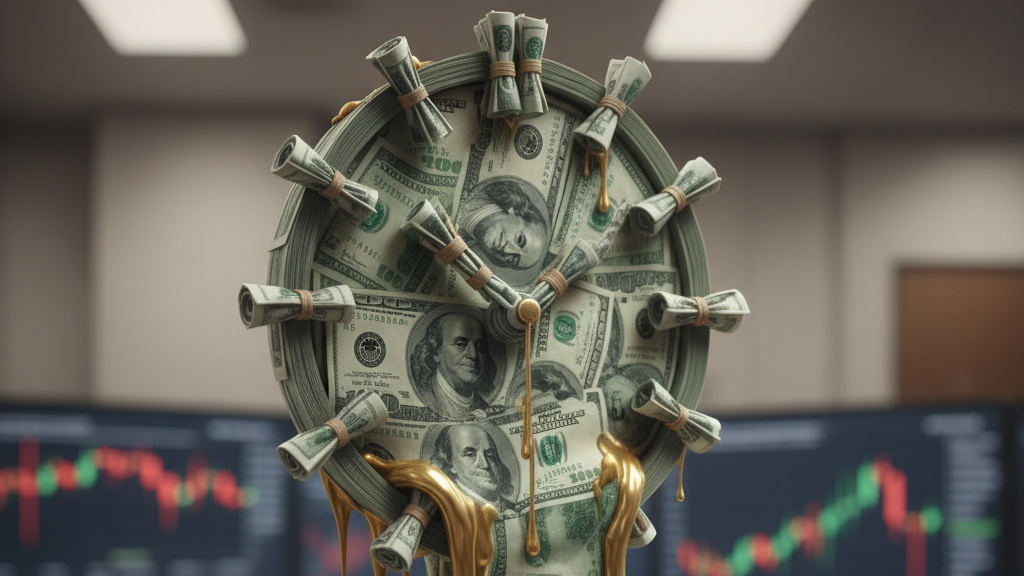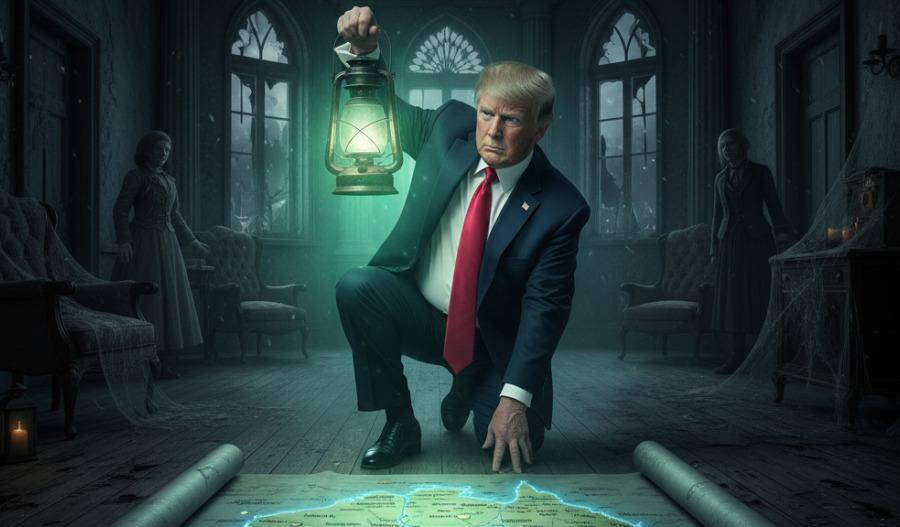It was a week where the market was so hot it kept melting valuations upwards, central banks eased their grip, and the world's two largest economies decided they might prefer talking to tariff wars after all. From Nvidia becoming the first US$5 TRILLION company to the Fed cutting rates while warning about inflation, and OpenAI eyeing a record-breaking $1 TRILLION IPO - the markets delivered enough drama to fill a month, not five days.
All the top moves, shakes, and red-hot takes from Azzet's editorial team are right here in your weekly business wrap every Friday (Halloween, 31 October, 2025).
Trillion-dollar club
Thursday brought a historic milestone that would have seemed absurd just a few years ago: Nvidia hit a $5 trillion valuation. It hit $4 trillion just three months ago…
The chipmaker's shares closed at $207.16, cementing its position as the engine room of the global AI revolution.
Founder Jensen Huang's stake is now worth $179 billion, making him the eighth-wealthiest person on the planet.
President Trump called him "an incredible guy" - high praise from a man not known for his restraint with superlatives.
Not to be outdone, Apple rang up a $4 trillion valuation earlier in the week on the back of strong iPhone demand, while Microsoft's association with OpenAI pushed its value above $4 trillion for the first time.
And speaking of OpenAI, the ChatGPT developer is eyeing joining the exclusive club straight away with a $1 trillion IPO that would rank among the biggest market debuts in history.
Despite CFO Sarah Friar insisting an IPO "is not our focus", CEO Sam Altman told staff it's the most likely path forward.
The company reportedly burned through $7.8 billion in operating losses in the first half of this year alone, so tapping public markets for at least $60 billion makes a certain kind of sense - if you can stomach valuations that have the Bank of England warning about an AI bubble ready to pop.
Powell cuts, but keeps the warnings coming
The Fed cut rates by 25 basis points to 3.75%-4% on Wednesday, marking the second cut this year and bringing borrowing costs to their lowest level in three years.
More significantly, the central bank announced it would halt quantitative tightening from 1 December, having already reduced its balance sheet by a cool $2.3 trillion.
U.S. Fed Chair Jerome Powell acknowledged the shutdown and Trump's tariffs were weighing on growth, but warned that inflation - which eased to 3% ahead of the meeting - could prove stickier than hoped.
"Higher tariffs are pushing up prices in some categories," he noted, while carefully avoiding any December commitments.
Treasury yields promptly rose in response.
The DXY ticked down amid softer-than-expected U.S. inflation, while Scope Ratings downgraded U.S. credit amid fiscal concerns - a gentle reminder that trillion-dollar deficits do eventually need addressing.
Trump and Xi: the art of the (tariff) deal
Friday brought the week's biggest geopolitical development when Trump and Xi struck a deal to cut China tariffs to 47% - down from 57% - following their first face-to-face meeting in six years.
The Busan summit, which Trump rated "12 out of 10" (naturally), delivered commitments on fentanyl enforcement, rare earths flows, and agricultural purchases.
China agreed to suspend this month's export restrictions on rare earths for 12 months, removing what had become Beijing's most powerful bargaining chip.
The Americans secured purchases of 25 million tonnes of soybeans annually over three years, plus TikTok's transition to U.S.-controlled ownership.
Beijing, meanwhile, got a one-year delay on restrictions targeting Chinese firms with partial ownership by sanctioned entities.
Markets showed limited reaction, having already priced in a partial trade thaw.
Earlier in the week, Trump had slammed an extra 10% tariff on Canada, though the administration later extended the looming trade deadline with Mexico.
His ASEAN visit yielded critical minerals pacts - because nothing says "America First" quite like diversifying your supply chains away from China.
Winners, losers, and ? marks
Earnings season delivered its usual mix of triumph and disaster.
Amazon surged 10% after hours on a Q3 beat, while Apple shares hit new highs after a record quarter. Even Eli Lilly surpassed expectations and raised 2025 guidance.
But not everyone had a banner-worthy week.
Meta shares plunged after the company flagged a "significant" increase in investment and expenses for FY26, with capital expenditure dollar growth expected to be "notably larger" than this year. Net income fell 83% to $2.7 billion, largely due to a one-off tax charge.
Investors weren't thrilled about Zuckerberg's commitment to "aggressively invest" in infrastructure.
Microsoft shares slid after first-quarter results and predictably chipmaker SK Hynix hit record-breaking profit for Q3.
Other notable results came from PayPal, HSBC, Visa, UnitedHealth, Woolies, Coles, Starbucks (which posted its first quarterly sales rise in two years), and EA, where net sales slid as a Saudi-led buyout looms.
Porsche shares crashed as China drove out market share - another warning for European automakers who've been slow to adapt.
Corporate carnage, cash splashes
Amazon announced 30,000 job cuts in its largest cull since 2022, while Paramount and Skydance began their first round of layoffs following their merger.
On the M&A front, Novartis is acquiring Avidity Biosciences for $12 billion, proving that pharma dealmaking hasn't lost its appetite for billion-dollar bets.
The AI infrastructure arms race continued apace: Nvidia invested $1 billion in Nokia for AI and 6G, Oracle, Nvidia and the Department of Energy signed up for the world's largest supercomputer, and Eli Lilly and Nvidia are creating a medicinal supercomputer.
AMD and the DOE will power $1 billion worth of AI supercomputers, and newcomer carmaker Lucid announced a new autonomous EV with Nvidia.
When you're the AI pickaxe seller, everyone wants to be your mate.
Uranium rallied on an $80 billion nuclear deal with Cameco, with VanEck naturally boarding uranium's growth train via an ETF.
Australia's critical minerals boom faces a harsh reality, though - turns out finding the stuff is easier than developing it economically.
Less cheerfully, a fatal mine blast halted Polymetals' share trading.
The rest of the world didn't stop spinning
Argentina took to the polls amid economic crisis, with Milei clinching a decisive win in the midterms - libertarian chainsaw economics apparently still polling well.
Catherine Connolly will be Ireland's 10th president, while Clarke Creek wind farm kicked off its first stage, and Drummond was anointed to sit on the AFL throne.
The other Drummond…
Not so surprising, Israel's strikes killed over 100 in the midst of ceasefire talks, and Jamaica was hit by a record-breaking storm of the century.
In American domestic affairs, food stamps will not be issued next month in the U.S., with the lapse leading to a state of emergency.
Meanwhile, U.S. airlines urged Congress to pay air traffic controllers, and the US shutdown prompted the Treasury to activate a fallback index.
Odds and split ends
In the "you couldn't make it up" category: Tesla's board warned Musk could walk away if not compensated.
Falling U.S. consumer confidence may tip the Fed's hand, while U.S. home prices slowed to their lowest gain in two years.
U.S. 30-year mortgage rates fell to their lowest in 13 months, offering a glimmer of hope for would-be homeowners.
Electricity costs powered Australian inflation's increase, Super Nation collapsed, burning trust in platforms, and ADP preliminary data showed US jobs rising by almost 15,000 - not exactly barnburner numbers.
In corporate strategy news, Lululemon doubled down in sport with an NFL collection (because yoga pants at the Super Bowl is apparently a thing now), Qualcomm shares popped as it moved into data centre chips, and Toyota production surged on U.S. demand despite tariffs.
China's industrial profits rose 21.6% even as mining sinks, and AI boosts big firms' output as small rivals lag - the productivity paradox remains alive and well.
Email attacks compromised 78% of organisations in 2025, so perhaps change that password you've been meaning to update since 2019.
Investors pivoted to defensive credit as bond yields rose, and for those wondering how to reduce tax under new excess super provisions, there's a guide for that.
Result and PE investment put fizz back into KDP shares - pun presumably intended.
And for the strategists among us, there's scepticism on AI and gold that matters when deciding where to invest.
What it all means
If this week taught us anything, it's that trillion-dollar valuations are becoming the new normal - whether they're sustainable is another question entirely.
The Fed's cutting rates while warning about inflation, China and America are talking instead of shouting (for now), and the AI arms race shows no signs of slowing down.
OpenAI might be free to go public after its handcuffs were removed, but whether public markets are ready for a company burning billions in pursuit of true artificial general intelligence remains to be seen.
Then again, Nvidia's at $5 trillion, so perhaps anything's possible.
Next week, presumably, we'll find out what happens when you mix rate cuts, trade deals, and AI hysteria in roughly equal measure.
Buckle up.



